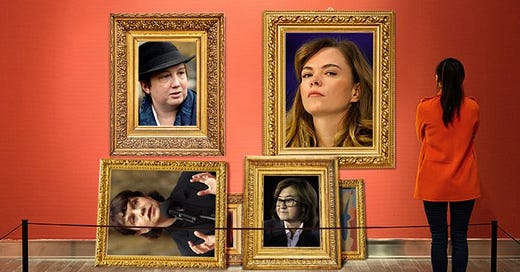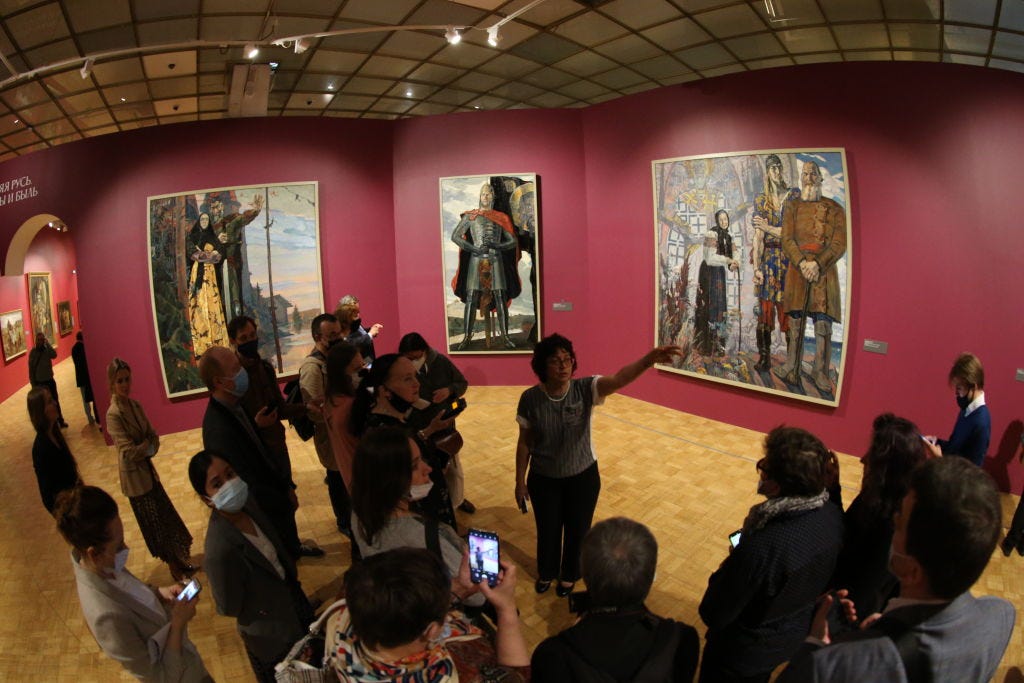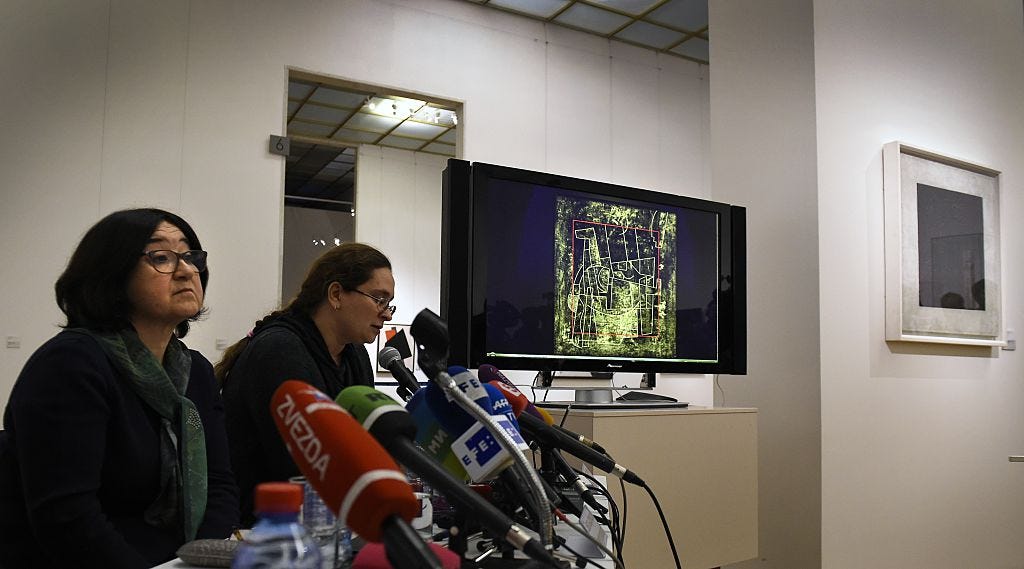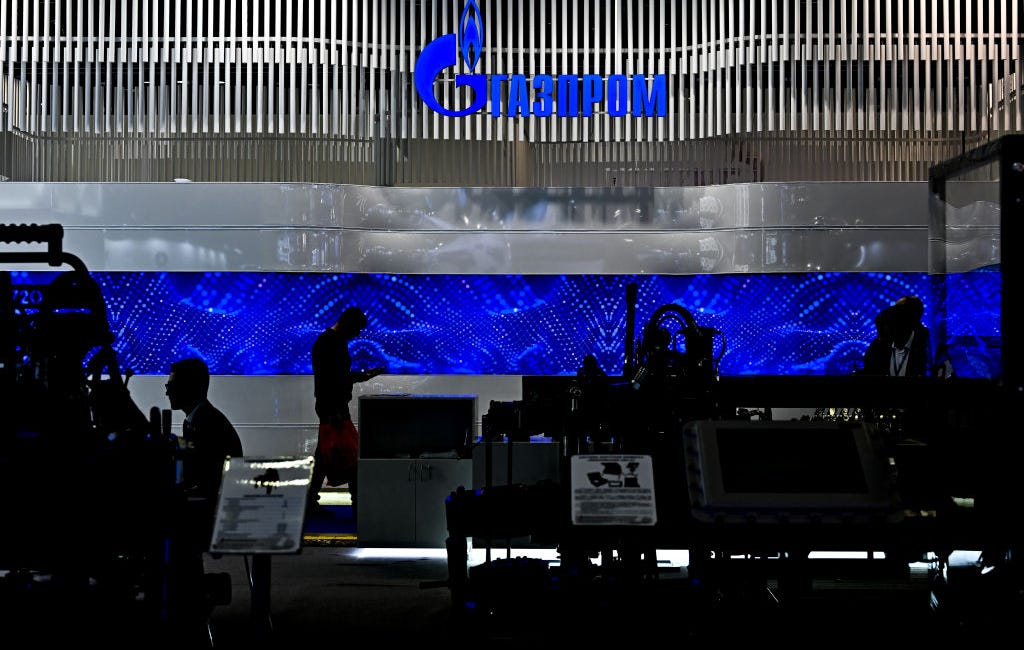Do the new appointments at Russia’s two largest state museums reveal the increasingly politicised face of Russian culture?
As the war in Ukraine continues, the BBC has been finding out how some sudden changes in the top management of Russia’s two highest profile museums, might be showing that ideology now trumps all.
By Amalia Zatari.
It started when the Ministry of Culture decided not to renew the contract with the director of the Tretyakov Gallery, Zelfira Tregulova. Next news broke that the director of the Pushkin Museum, Marina Loshak had resigned. But it was not until they were replaced by less well-renowned and experienced women, who were crucially (according to our sources) totally loyal to the authorities, that questions really started to be asked.
Earlier this year on Monday the 27th of March, The Pushkin Museum – like most museums in Moscow on the first day of the week – was closed to visitors. But in the evening, a small crowd gathered there in order to say goodbye to the director of the museum, Marina Loshak, who had led the oragnisation for almost 10 years.
Loshak made a “short, passionate speech and said that she ‘loves everyone’ and that ‘you need to breathe in and out,’” one museum employee told the BBC. According to him, “she seemed to cry, and someone from the audience also wept" during her speech.
The event was also attended by the new director of the museum, Elizaveta Likhacheva, who had been recently appointed to the position by the Ministry of Culture.
‘Excellent art critic and pro-government person’
Before being appointed to the Pushkin Museum, 44-year-old Likhacheva had worked for almost 17 years at the State Museum of Architecture named after A.V. Shchusev (MUAR) in Moscow, including the last six years as its director.
On Friday, March 24, three days before the evening of Loshak’s farewell at the Pushkin Museum, the Museum of Architecture said goodbye to Likhacheva. Art historian Ksenia Korobeynikova, who was at the event, recalls that the MUAR staff “mourned, with some weeping and giving Likhacheva flowers."
Back in February of this year, Korobeynikova, included Likhacheva amongst the ranks of "intelligent managers, with strategies and tactics, honest and with ‘balls’ (courage), who know the business model of museums."
BBC is blocked in Russia. We’ve attached the story in Russian as a pdf file for readers there.
In a press release about Likhacheva’s appointment to her new role at the Pushkin Museum, the Ministry of Culture pointed to her successes at the Museum of Architecture. Attendance had quadrupled in six years, inclusive programs began to develop, and active cooperation with Russia’s regions commenced. "Likhacheva really did a miracle at MUAR," says a former employee of the Ministry of Culture. According to him, she was able to get people interested in architecture. "She showed the ministry what she can do."
Likhacheva is well thought of by the culture minister Olga Lyubimova, several BBC sources say. Lyubimova repeatedly visited the MUAR and was interested in the development plans for the museum. Likhacheva personally gave the minister a guided walk through the museum’s exhibitions.
However, since the news about the appointment of Elizaveta Likhacheva to the Pushkin Museum was made public, a wave of criticism has been aimed at her on social media.
But it’s not architecture that those dissatisfied with the appointment of Likhacheva remember her for, it was her earlier career working in Russia’s internal policing bodies in the early 2000s. An unusual line of work for a creative director you might think. Long before Likhacheva went to get her an art history education she worked with the Federal Migration Service, where she was mainly engaged in the development of the agency's website.
Amoungst her other early careers in the early 2000s, Likhacheva managed a stint working in the pro-Kremlin youth movement Walking Together. Explaining her early work experience in an interview with TV channel RTVI, Likhacheva said that “at that time the organisation was not pervaded by a pro-Putin feeling and received standard funding.” She made the decision to leave after a rally at which activists of the movement threw books by a renowned author Vladimir Sorokin into the toilet, Likhacheva said.
One source of ours, familiar with Likhacheva, calls her political views "pro-government."
"I love my country. For real. I believe that Russia is the best place on Earth, the freest. There is no cooler country than Russia," she said in the same interview with RTVI.
At the same time, Kira Dolinina, an art critic and columnist for the Kommersant publishing house, noted that many were ready to perceive Likhacheva's candidacy rather positively, albeit with a caveat – “for today’s times". "But we are dropping the bar very much," she adds.
After Likhacheva's appointment, a screenshot from an old video was posted on Twitter, which seemingly showed that Likhacheva had a photograph of Joseph Stalin in her old office in the MUAR. The photo in question – taken in 1950 - turned out to depict Moscow’s Taganskaya metro station. Likhacheva, had been presented with the photo as a present for her birthday by the museum’s staff.
Nevertheless, Likhacheva was immediately credited with sympathy for Stalin, and RTVI journalists asked her in an interview about her attitude towards him. "My position is simple – he is dead," Likhacheva replied, adding that today "he is a subject of pop culture for us, like Mickey Mouse."
Three weeks after the release of this interview, the deputies from the Communist Party in the Russian Parliament, the State Duma, appeared to be offended by the comparison of the Soviet dictator with Mickey Mouse. Consequently, sending an appeal to the Investigative Committee demanding to initiate a criminal case against Likhacheva and remove her from the post as head of the Pushkin Museum.
"Elizaveta made a deal with the devil and must now play by his rules," Likhacheva's friend comments.

In his opinion however the appeal of the Communist party parlamentarians will have no consequences, "she has just been appointed, and the minister will intercede," but it will be a lesson for Likhacheva that as director of the Pushkin Museum she will have to think carefully about what she says in public.
Last autumn, led by Likhacheva, the MUAR took part in a project called “Our Traditions”, which, since the summer of 2022, has been organised by the Russian Ministry of Culture and the [World War Two] Victory Museum, in the occupied territories of Ukraine. The project’s remit is to lead on “integrating new regions into the cultural life of Russia." As a result 14 Russian federal museums, including the MUAR, brought exhibitions to the Donbas.
As part of the project, the MUAR opened an exhibition in Luhansk with photographs of the cities of the Luhansk region in the 1950s, during their restoration and reconstruction after the Second World War. Likhacheva then called the exhibition a "humanitarian action”.
"For the past eight years, people [of Donbas] have been deprived of access to art, they cannot visit museums. In my opinion, this deprivation is a war crime, even if it is not recognized by the Geneva Convention."
One of Likhacheva's acquaintances, in a conversation with the BBC, called her decision to take part in this project ‘strange’.
‘None of us knew this woman’
Back in Moscow and just across town in February of this year, just before Loshak's resignation, the Ministry of Culture fired the director of the Tretyakov Gallery, Zelfira Tregulova. Her replacement (39-year-old Elena Pronicheva) is the daughter of a retired high-ranking FSB general Vladimir Pronichev,
Until his resignation in 2013, Pronichev Snr headed the FSB Border Service for 10 years, and before that he oversaw the fight against terrorism in the country. In the late 1990s, when the FSB was headed by the future Russian President Vladimir Putin, Pronichev managed to work briefly as his first deputy.
His daughter Elena Pronicheva, unlike Likhacheva, does not have a specialised education or background in art history, but in the 2010s she began to hold senior positions in Russian museums. In 2013, she became the executive director of the Jewish Museum and Tolerance Center, and in 2020 she was appointed director of the Polytechnic Museum in Moscow.

Neither at the Jewish Museum nor at the Polytechnic did Pronicheva particularly distinguish herself, Korobeinikova believes. The Polytechnic Museum, which was closed 10 years ago for renovation and reconstruction work, never re-opened under her tenure. The reconstruction work was due to have been completed at the end of 2021, it is still yet to be completed.
"None of us knew the woman who became the head of the Tretyakov Gallery. We all read about her on the Internet," says an employee of the Tretyakov Gallery.
After Pronicheva was appointed to the Polytechnic, the museum team immediately perceived her as a pro-government person, and some employees began to quit, one of our sources recalls. "Some of her colleagues called her an effective manager, whilst someone left with the words, “It will be just a prison, dear friends."
At the time of Pronicheva's arrival at the Polytechnic, the museum had a range of social partnership programs, with several NGOs and the human rights centre Memorial (designated by the Russian authorities as a “foreign agent” and later ordered to close by a court decision).
The staff at the Polytechnic Museum had wanted to maintain at least some links with the Memorial, after it received the status of “foreign agent"; however, the management insisted that this should cease. "We were told, 'These are very good people, but under the new director we cannot cooperate with them,'" says a former museum employee.
After the Russian invasion of Ukraine on February 24, 2022, the various heads of departments at the Polytechnic Museum gathered together their employees and announced that the museum management had received a wish that “they [the employees] behave decently”; this in reality meant that they should not post or comment on anything on social media relating to the war, should not go to anti-war meetings, and even not say the word "war" when talking about the conflict.
When our source responded by saying that he thought this was wrong, he was told that, "If you do not agree, then you can quit." Later, he decided to leave his post at the museum.
It is now most likely that not a single Russian state museum, is able to publicly take an anti-war position or cooperate with “foreign agents” like the now closed Memorial centre. This would be the case under any management not simply under Pronicheva, our source tells us. He also explained that his decision to quit was prompted by the fact that the authorities had simply issued a decree with no discussion or recognition that there might be conflicting opinions on these events.
The list of new appointments has continued with Dmitry Kozhanov being appointed General Director of the Polytechnic replacing Pronicheva. Prior to his new role, Kozhanov was an aide to the president of the Kurchatov Institute, Mikhail Kovalchuk, who is believed to be a member of Vladimir Putin's inner circle.
The Kurchatov Institute was founded in the USSR to create nuclear weapons, and now closely works with the Russian Ministry of Defense, including (among other things) working on projects in the field of weapons development.
Sociologist and museum expert Anatoly Golubovsky called Kozhanov "a stranger in the field of culture", and his appointment to the Polytechnic Museum "absolute madness."
‘A pro-authority, reliable person’
Regarding the appointment of Pronicheva to her new role as the director of the Tretyakov Gallery, Ksenia Korobeynikova points out that it was important for the Ministry of Culture to appoint a “pro-government and reliable person” as someone who would “clearly carry out everything that is sent down from above.”
When asked about how the museum reacted to the appointment of Pronicheva a current employee told us “In general, everyone understands everything.”
The former director of the Tretyakov Gallery, Zelfira Tregulova, headed the museum for eight years. Throughout her time there, while constantly finding herself having to compromise with the authorities, in some ways she managed to successfully argue her point as well, says Korobeynikova.
The cancellation of the Moscow International Biennale of Contemporary Art last year was one such example. It was supposed to open in the Tretyakov Gallery in early November, but a few days before opening, the event was cancelled. Among the reasons for the cancellation, included the fact that the organisers selected pieces "were excluded at the approval stage."
What exactly was discussed was not officially reported. However, from the list of participants it appears that there was not a single foreign representative, with two artists representing the Donbas “republics” annexed by Russia.
Speaking about the "compromises" that Tregulova made, Korobeynikova recalls how last summer, for three days, Andrei Rublev's "Trinity" icon was taken from the Tretyakov Gallery to the monastery Trinity-Sergius Lavra, despite the protests of art critics and restorers who believed that the extreamly old and immensely valuable artwork would be damaged if it were not kept in the carefully controlled conditions of the museum.
When the icon returned to the Tretyakov Gallery, it was not included back in the permanent exhibition. A few months later, Korobeinikova reported that after it’s trip to the Trinity-Sergius Lavra, "61 significant changes" were found on the medieval artwork.
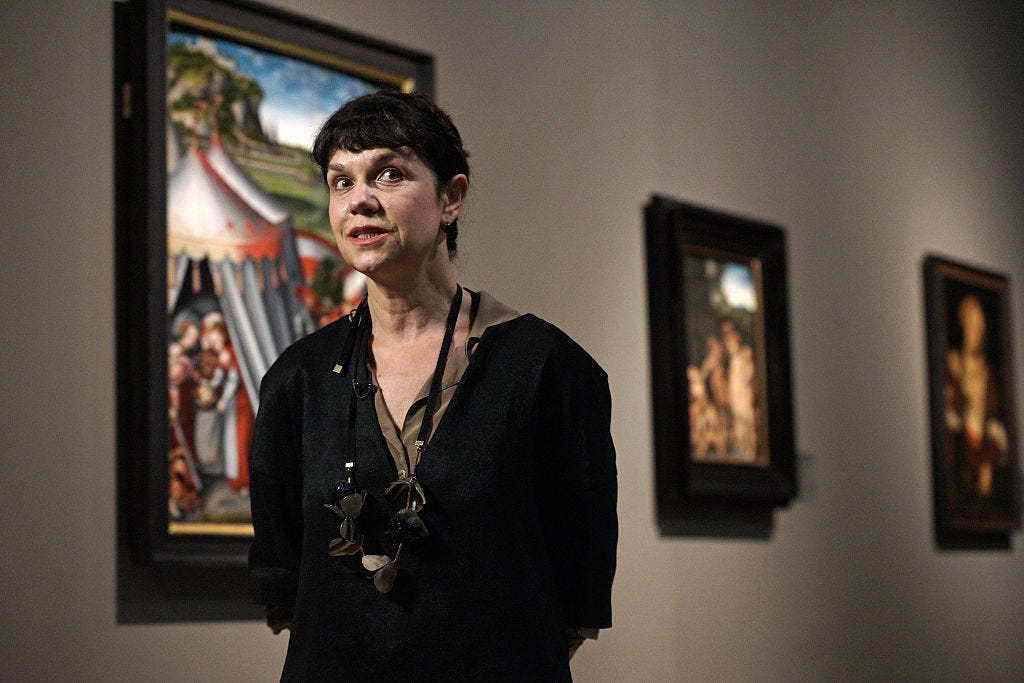
The gallery has refused to speak to the BBC about the incident.
On the 15th of May 2023, President Putin signed a decree transferring Rublev’s famous work to the custody of the Russian Orthodox Church.
It has since transpired that the orders to transport the icon for the celebrations of the Russian Orthodox Church were signed off by Tregulova's deputy, as Tregulova herself had at that precise moment gone on vacation.
Tregulova has also been on vacation during other critical moments for the museum, for which she has been repeatedly criticised. This could be interpreted as her unwillingness to sign orders that are unpleasant for her, but the former employee of the Ministry of Culture believes otherwise, "she made those decisions, (but) she simply did not want to be responsible for them."
"I think this is also one of the reasons why Tregulova left her post," he said.
‘No one wants to do bad’
"You see, no one wants to do something bad [to the museum]. The Ministry [of Culture] has no such task – to spoil this or that institution," a former employee of the department tells us when asked about the change of heads of major museums.
According to him, the ministry makes personnel decisions based on the analysis of the situation at a particular institution at one stage or another. In the past, when Loshak was appointed to the Pushkin Museum, and Tregulova to the Tretyakov Gallery, those were the right decisions, because both museums needed a “breath of fresh air” at that time, a spokesperson tells us.
Anatoly Golubovsky tells us that during their years in the top jobs Loshak and Tregulova, had both seen their museums through great periods of renewal.
Liquidation of the ‘poorly manageable’
Loshak and Tregulova had held their posts for quite a long time – says art historian and curator Victor Misiano. What is alarming, in his opinion, is that they were not offered any alternative positions of employment in return, ones that would correspond to their competence and experience.
According to Anatoly Golubovsky it is the very content of the work that Tregulova and Loshak did that did not ideologically fit with the new Russian political reality. In his opinion, ‘in the current situation, Tregulova should have been fired immediately - for ideological reasons - because of the exhibitions she has recently organised in the Tretyakov Gallery.’
Golubovsky calls the dismissal of Tregulova and Loshak “the liquidation of ‘poorly manageable’ bright characters.” They were probably not loyal enough to the authorities and not “mobilised” enough in the current circumstances, he says.
‘The front line is not only in the Donbas’
Neither Tregulova nor Loshak have ever publicly opposed the Russian invasion of Ukraine. At the same time, neither of them (unlike the head of the Hermitage, Russia’s main museum in Saint-Petersburgh, Professor Mikhail Piotrovsky) has ever spoken out in support of the ‘special military operation’ [the war in Ukraine] either directly or indirectly, adds Golubovsky.
However according to a former employee of the Ministry of Culture it would be inaccurate to base any assumptions about the reshuffles at these museums (and the appointment of Likhacheva and Pronicheva to their new posts) simply on the nature of their support for the Russian government.
He also notes that “we are now going through one of the most difficult periods in the life of our country,” referring to Russia’s invasion of Ukraine. “And no matter how pathetic it may sound, the front line is not only in the Donbas. Every person chooses to support their country or not.”
“The director of a museum is a public position,” he goes on to say. “And if a person does not consider it possible for himself or herself to approve of what is happening in our country, then it seems reasonable to me that he or she should leave of their own accord. It’s a little strange, if a person is against the special military operation, but at the same time receives a salary and enjoys some other privileges from the Russian state”.
Read the full story in Russian here.
English version edited by William Edelsten.
Ukraine war: What do we know about Gazprom’s private army
By Elizaveta Fohkt and Ilya Barabanov. For several weeks media outlets and Russian pro-war bloggers have been reporting tensions between Wagner mercenaries and private military companies linked to Russia’s giant state gas producer Gazprom. Wagner boss Evgeny Prigozhin confirmed the existence of three groups called Stream, Torch, and Flame at the end of A…

